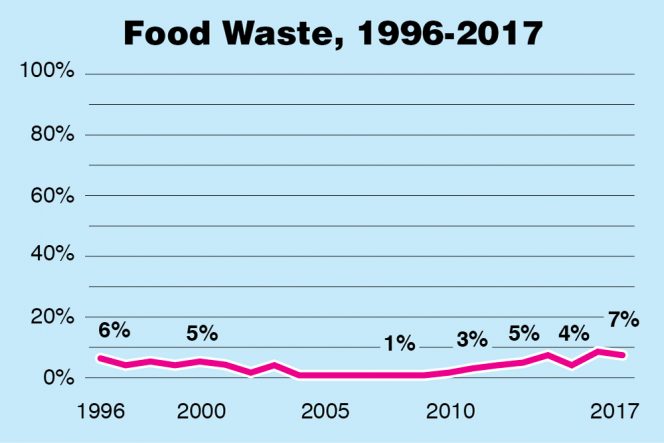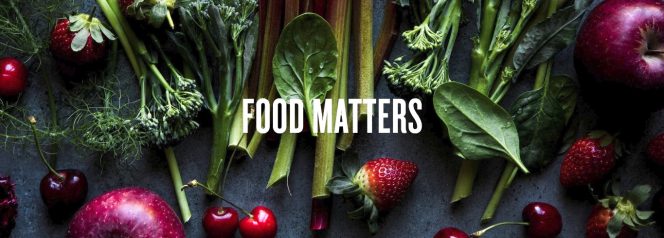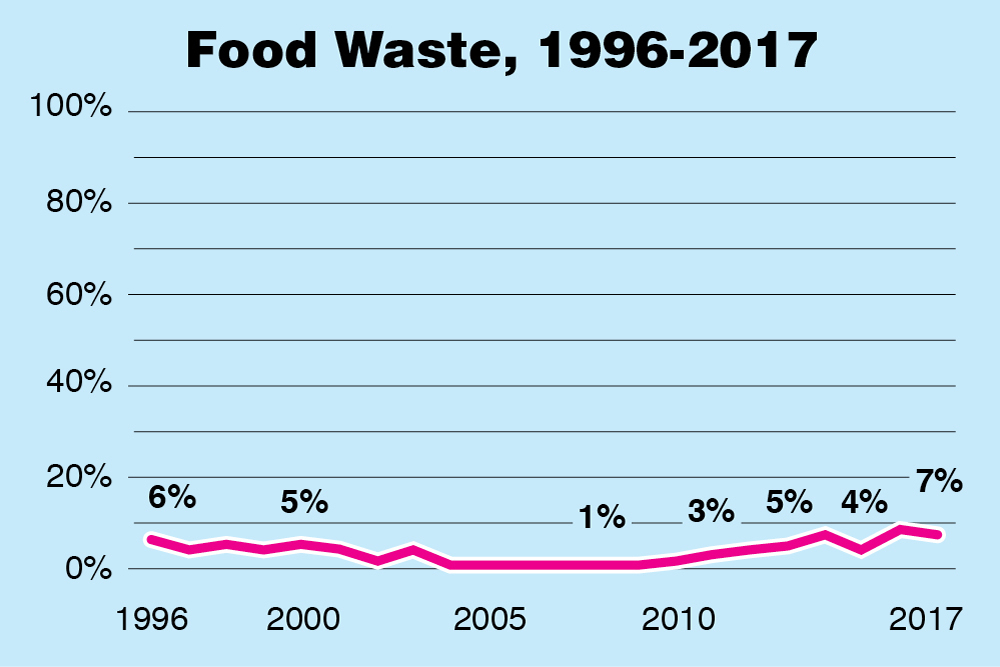Florida Needs More Organics Recycling To Hit 2020 Goal
 In 2010, the Florida Legislature set a 75% statewide recycling goal for MSW to be achieved by 2020 (403.706, Florida Statute). The statute allows electricity produced from MSW (via waste-to-energy) or landfill gas to count towards the recycling rate, in the form of credits. The Legislature also set that same goal for counties with over 100,000 in population, and directed all counties to report their recycling progress to the Florida Department of Environmental Protection (FLDEP) annually.
In 2010, the Florida Legislature set a 75% statewide recycling goal for MSW to be achieved by 2020 (403.706, Florida Statute). The statute allows electricity produced from MSW (via waste-to-energy) or landfill gas to count towards the recycling rate, in the form of credits. The Legislature also set that same goal for counties with over 100,000 in population, and directed all counties to report their recycling progress to the Florida Department of Environmental Protection (FLDEP) annually.
In 2017, the most recent year that data is available, the statewide overall recycling rate, which includes renewable energy recycling credits, is 52%. The statewide traditional recycling rate, which excludes renewable energy recycling credits, is 42%. In terms of organics recycling, 59% of yard trimmings generated in the state and 7% of the food waste were recycled in 2017. In a presentation on Florida’s organic waste generation and recovery in 2019, Karen Moore of FLDEP noted that the 75% goal is weight based. So to help achieve the goal in 2020, “we need heavier materials being recycled, so there is a push to recycle more C&D and organics.”
NRDC’s Food Matters Toolkit
 NRDC’s Food Matters program provides cities and other partners with an understanding of the range of policy and program options they can use to reduce food waste, and to support informed decision-making about what strategies may be most feasible and effective in their communities. To help cities implement the strategies, NRDC recently released its Food Matters toolkit that includes a wide array of guides and templates that are now available on the Food Matters website. Guides included are:
NRDC’s Food Matters program provides cities and other partners with an understanding of the range of policy and program options they can use to reduce food waste, and to support informed decision-making about what strategies may be most feasible and effective in their communities. To help cities implement the strategies, NRDC recently released its Food Matters toolkit that includes a wide array of guides and templates that are now available on the Food Matters website. Guides included are:
• Strategic Communications and Partnerships: Framework to guide how to build a communications strategy and community support.
• Generation and Food Rescue Potential Baseline Calculator: Baseline calculator process, and tips to communicate results of the calculator.
• Progress Metrics: Potential metrics to assess progress on food waste interventions, including both qualitative and quantitative metrics.
• Restaurant Challenge: Involving restaurants and other sectors, including hospitality and retail, through food waste challenges that engage local businesses in adopting specific practices to reduce the amount of food going to waste, donate surplus food, and recycle food scraps.
• Public Education: Information on how cities can communicate food waste awareness and household prevention strategies to their constituents.
• Health Inspector Training for Food Donation: Provides training materials to mobilize inspectors as ambassadors for safe food donation and share needed information with licensed food facilities about how to donate safely.
• Food Rescue Client Survey: Practical, adaptable tools to solicit input from end-users to ensure that the voices of those who seek food assistance are integral to the community dialogue about the future of a city’s food rescue system.
• Food Donations from Farms: To address the acute need for donation of fresh fruits and vegetables and other farm-fresh products, beyond what is currently being donated, this guide focuses on how to engage farmers. It includes a farm survey instrument NRDC created for its program in Nashville and survey results.
Carbon Storage In Soil Protocol — Jan. 15 Webinar
The Climate Action Reserve (CAR) is launching an offset protocol development process to incentivize agricultural practices that enhance carbon storage in soils. The Soil Enrichment Project Protocol (SEPP) is being funded by Indigo Ag, Inc., which will be an active workgroup participant. The protocol is expected to be completed in June. The primary greenhouse gas (GHG) benefit targeted will be accrual of additional carbon in agricultural soils. The protocol may also address GHG emission reductions from other sources, such as nitrous oxide from fertilizer use.
Research studies are finding that compost application does increase carbon storage. Compost manufacturers and marketers, as well as agricultural producers, can attend a CAR webinar on January 15, 2020 at 10 am Pacific to learn more about the Soil Protocol being developed.
BioCycle will be taking a deep dive into compost and carbon sequestration at its Compost Use Workshop on Monday, March 30, 2020, kicking off BIOCYCLE CONNECT WEST 2020 Conference, March 30-April 2, 2020 in Sacramento. The Workshop will be held at the University of California, Davis’ Russell Ranch. Receive Conference and Workshop updates










